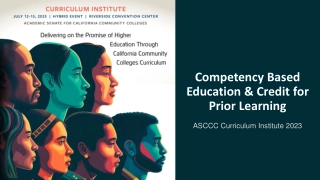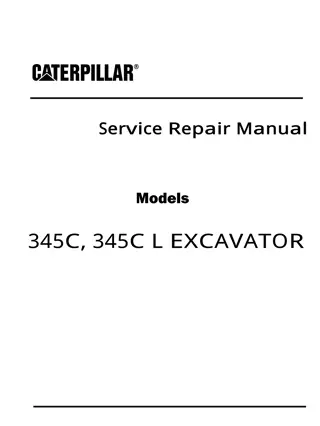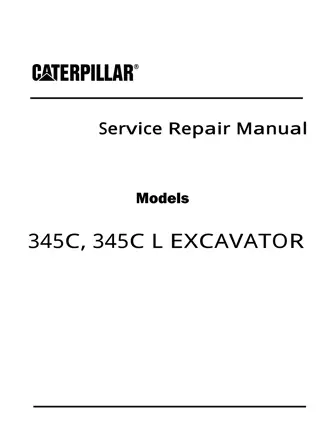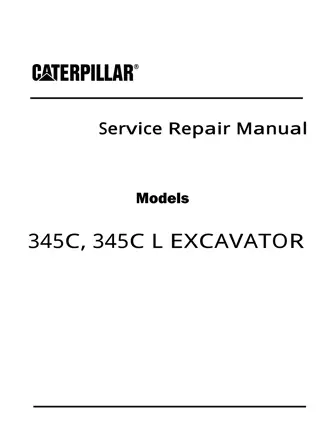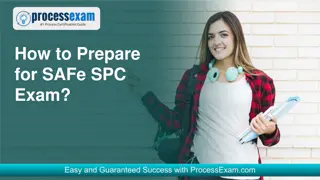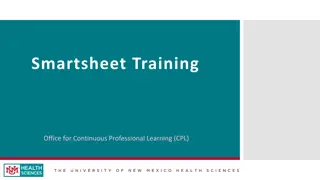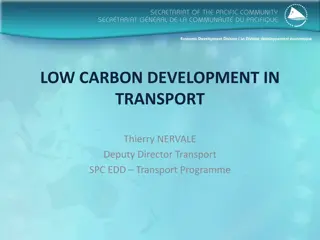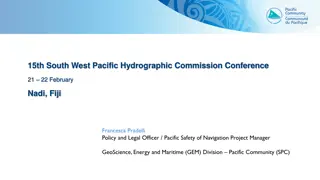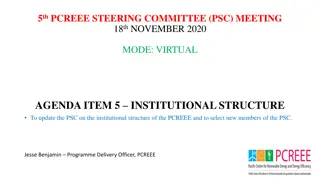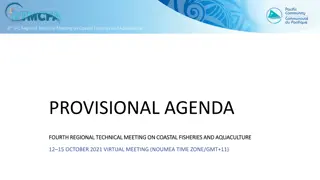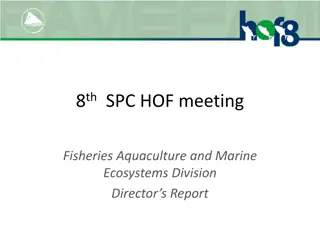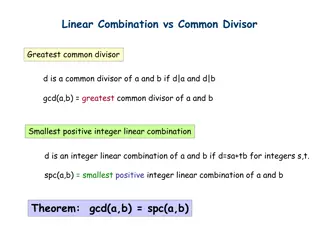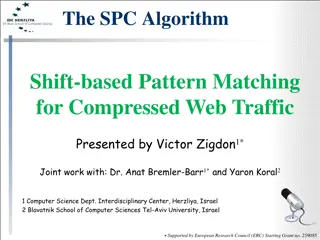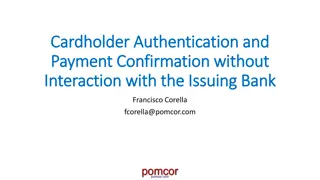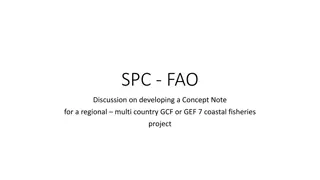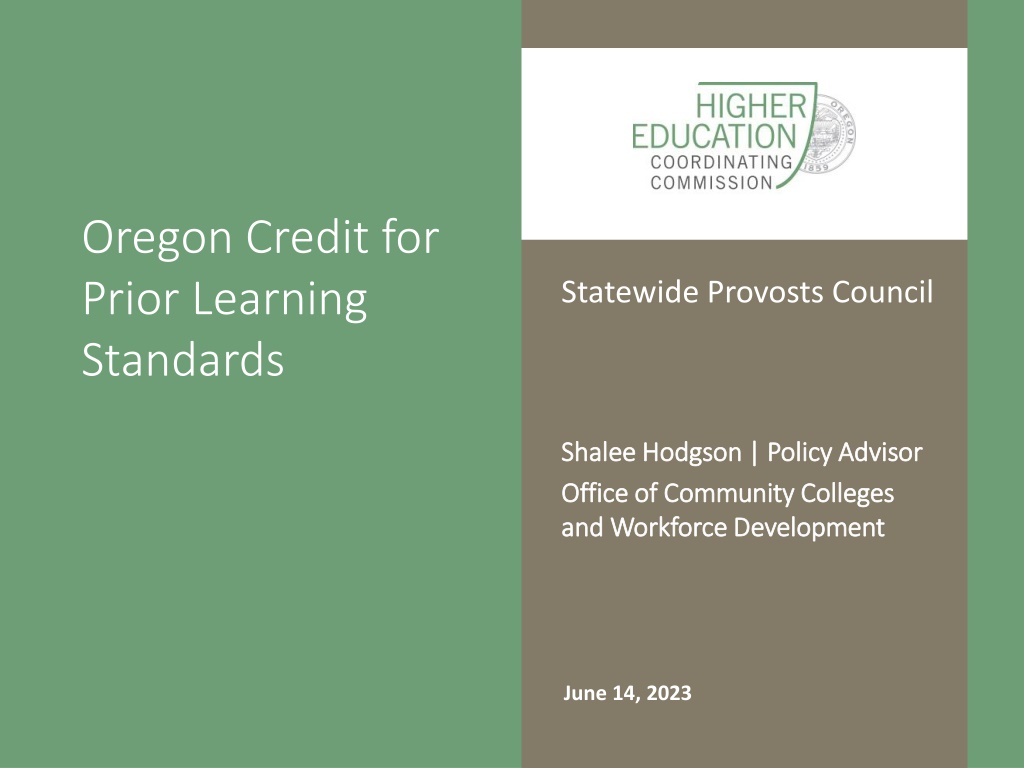
Oregon Credit for Prior Learning Standards and Implementation
Learn about Oregon's Credit for Prior Learning standards, including the goals set by the Higher Education Coordinating Commission and the formalized structures in place to support implementation. These standards aim to increase the recognition of prior learning experiences and skills, improve transparency in the credit awarding process, and enhance faculty expertise in evaluating prior learning.
Download Presentation

Please find below an Image/Link to download the presentation.
The content on the website is provided AS IS for your information and personal use only. It may not be sold, licensed, or shared on other websites without obtaining consent from the author. Download presentation by click this link. If you encounter any issues during the download, it is possible that the publisher has removed the file from their server.
E N D
Presentation Transcript
Oregon Credit for Prior Learning Standards Statewide Provosts Council Shalee Hodgson | Policy Advisor Shalee Hodgson | Policy Advisor Office of Community Colleges Office of Community Colleges and Workforce Development and Workforce Development June 14, 2023
Credit for Prior Learning The knowledge and skills gained through work and life experience, through military training and experience and through formal and informal education and training from institutions of higher education in the United States and in other nations.
Oregon Revised Statute (ORS) 350.110 ORS 350.110 (HB 4059, 2012) - Coordination between Higher Education Coordinating Commission, public universities, community college districts and independent for-profit and not-for-profit institutions of higher education; common goals; advisory committee; annual reporting. (1) The Higher Education Coordinating Commission shall work with public universities listed in ORS 352.002, community college districts and independent for-profit and not-for- profit institutions of higher education to carry out the following goals: 3
Credit for Prior Learning in Oregon ORS 350.110 Goals for the Higher Education Coordinating Commission and higher education institutions: Increase the number of students receiving Credit for Prior Learning (CPL) Increase number and type of high-quality CPL accepted at institutions Develop transparent processes for awarding CPL Improve prior learning practices across institutions Create tools to develop faculty and staff knowledge and expertise with CPL Develop articulation agreements for particular programs awarding CPL Develop outcome measures and track progress toward goals 4
Formalized Structures to Implement Goals Credit for Prior Learning Advisory Committee Appointed and convened by the Higher Education Coordinating Commission to coordinate the implementation of Credit for Prior Learning, develop and revise standards to support and improve policies and practices. Credit for Prior Learning Standards Adopted in 2014 and revised in 2017 the Standards are aligned with Northwest Commission on Colleges and Universities Accreditation Standards and provide guidance to colleges and universities implementing Credit for Prior Learning. 5
Timeline: Credit for Prior Learning Standards 2012 Oregon Legislature passes HB 4059 (ORS 350.110) 2013 CPL Advisory Committee is convened to develop CPL Standards 2014 CPL Standards approved and adopted by HECC 2014-2016 CPL Advisory Committee receives feedback and questions related to CPL Standards implementation 2017 CPL Advisory Committee revises CPL Standards 2020 NWCCU revised Regional Accreditation Standards 2022 Future Ready Oregon Credit for Prior Learning funding awarded to 19 public institutions 2023 CPL Advisory Committee is convened to review and recommend revisions to the CPL Standards 6
Credit for Prior Learning Advisory Committee Members representing the groups specified in ORS 350.110 were appointed in early 2023 by the HECC Commission and started meeting in March 2023 Public universities Community colleges Independent not-for-profit institutions of higher education For-profit institutions of higher education offering degree programs The business community The labor community A student at a two-year or four-year institution of higher education Other members appointed by the Higher Education Coordinating Commission based upon a demonstrated interest in and knowledge of prior learning programs 7
CPL Advisory Committee Current Work The full CPL Advisory Committee meets monthly initial focus is on revising the Standards Small groups of Advisory Committee members working together to recommend revisions to each Standard Draft of Standards 1-4 is currently going though an initial vetting and feedback process facilitated by the Advisory Committee Assess current CPL policy, support, and gaps to make recommendations to the Commission and Legislature Provide input and guidance on the ORS 350.110 annual report to the Legislature 8
Standards 1-4 Proposed Revisions Standard 1: Credit for Prior Learning Requisites Added flexibility to the composition of the CPL Leadership Team Specified that CPL only be awarded for courses approved by the institution s curriculum approval process Added support for institutions to determine limits on the amount of CPL that can be used to satisfy degree requirements Types of CPL Grouped industry certifications, professional licensure, military credit, and other forms of transfer into one category Removed references to the 25% cap from portfolio Standard 2: Evidence Based Assessment No changes 9
Standards 1-4 Proposed Revisions Standard 3: Tuition and Fee Structure Revised to note fees charged should be based on the services performed in the process rather than credit awarded Removed specific cost examples Standard 4: Transferability and Transcription Expanded 4.2 to provide guidance on accepting or rejecting CPL based on the course rather than the type of credit awarded Added 4.5 related to accepting CPL as elective credit for transfer if it is based on third-party assessment but does not match one of the receiving institution s approved fields of study (moved from Standard 1) 10
Relevant NWCCU Standards Student Learning - https://nwccu.org/accreditation/standards- policies/standards/ 2.C.1 The institution s transfer-of-credit policy maintains the integrity of its programs and facilitates the efficient mobility of students desirous of the completion of their educational credits, credentials, or degrees in furtherance of their academic goals. 1.C.8 Transfer credit and credit for prior learning is accepted according to clearly defined, widely published, and easily accessible policies that provide adequate safeguards to ensure academic quality. In accepting transfer credit, the receiving institution ensures that such credit accepted is appropriate for its programs and comparable in nature, content, academic rigor, and quality 11
Current Draft Standards 1-4 May 2023 Double click text to view entire document Standard 1 - Credit for Prior Learning Requisites 1.1 For those areas in which CPL is awarded, each institution shall develop institutional policies and procedures for awarding credit in response to the CPL Standards, which have been aligned with the NWCCU accreditation standards. Institutional policies and procedures must be designed to maintain the integrity of the degree including residency requirements. These policies and procedures must be transparent to all students, faculty, staff, and business and industry stakeholders. 1.2 Institutional policies and procedures shall ensure credit is granted for documented learning and awarded only for high-quality college-level competencies. To ensure consistent quality, each institution shall create CPL policy and processes, overseen by a centralized team of responsible leaders, with the work informed by a cross-functional set of relevant campus partners ( examples: student success/advising units, instructional faculty, faculty governance, the registrar s office, financial aid and other personnel associated with awarding or processing CPL credit). 1.3 Academic credit awarded through CPL that is transcripted on the official institutional transcript (portfolio and challenge credit) will be notated as CPL. CPL credit will be awarded only for those courses formally approved by the institution s curriculum approval process within the approved academic disciplines of the institution. 1.4 Institutional policies may address any overarching limits on how much CPL programs can use toward degree requirements. Any institutional limits on CPL credit accumulation set by an institution or program should be made explicit and transparent to students. Such limits should be carefully considered and based on institutional and program needs and requirements, connected closely to student academic success outcomes. Institutions should maintain the goal of maximizing appropriate CPL credit awards to support student credential attainment through lower costs and time-to- degree/credential. 1.5 Credit awarded through CPL must be directly applicable to meet requirements for general education, a certificate, a degree, or electives as outlined in college publications. Credit may be awarded through these types of CPL as noted below: Transfer Credit Credit by Exam (CLEP, DANTES, etc) Industry Certifications, Professional Licensure, Military Credit (ACE Credit Recommendation Service) Other Forms of transfer Institutional Credit Institutional Challenge Exams and other exams. Challenge exams must be driven by institutional policy with the expectation of involving faculty with awarding credit and developing exams for their respective areas of expertise. These exams should be based on valid and reliable instruments. The tests must be available to ALL interested students Prior Experiential Learning/Prior Learning Assessments (PLAs) e.g., portfolios. Assessment methods are designed to identify what a student has learned through one s life and work experience outside the classroom that is equivalent to learning gained through formal collegiate instruction. These prior learning assessments are separate from third-party testing such as ACE or institutional challenge examinations. Portfolios must be reviewed by qualified content experts. Credit is awarded based on the faculty/content expert review of the portfolio at the institution Other forms of authentic assessment to award CPL credit Resources: NWCCU 2.C.1The institution s transfer-of-credit policy maintains the integrity of its programs and facilitates the efficient mobility of students desirous of the completion of their educational credits, credentials, or degrees in furtherance of their academic goals. NWCCU 1.C.8 Transfer credit and credit for prior learning is accepted according to clearly defined, widely published, and easily accessible policies that provide adequate safeguards to ensure academic quality. In accepting transfer credit, the receiving institution ensures that such credit accepted is appropriate for its programs and comparable in nature, content, academic rigor, and quality Standard 2 - Evidence Based Assessment 2.1 Each institution shall provide a guided process to assess student learning and to provide the required evidence for awarding credit. The student must document the connection between what they have learned in another setting and the theoretical foundation, knowledge, and skills as defined by the course-specific learner outcomes of the credit to be awarded. 12
Questions: Shalee Hodgson, Ed.D. Shalee.hodgson@hecc.oregon.gov Cell 971-372-0889 www.oregon.gov/highered

